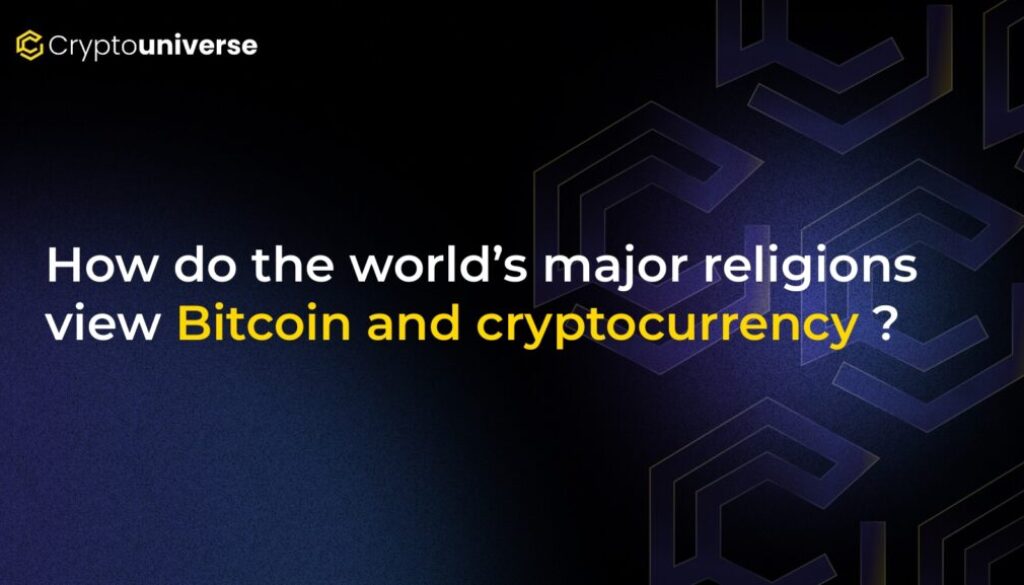How do the world’s major religions view Bitcoin and cryptocurrency?

Faith and Finance: An Age-Old Dilemma Meets a New Technology
Since the dawn of currency, the world’s great religions have wrestled with the profound impact of money on morality, wealth inequality, and human dignity. From warnings against the corrupting influence of riches to calls for ethical financial stewardship, faith leaders have long provided guidance on navigating the material world. As the 19th-century Hasidic rabbi Menachem Mendel Kotzk cautioned, “Through money, even the incorruptible can become corrupted.”
Today, this ancient conversation is being revitalized by a disruptive new force: digital currency. The rise of decentralized, borderless money presents a unique set of challenges and opportunities for religious communities. This brings us to the central question: how do the world’s major religions view
Islam and Cryptocurrency: A Matter of Divine Law
In Islam, financial activities are governed by Shariah law, which has strict definitions for permissible currency and explicit rules against usury (interest) and excessive uncertainty (gharar). With no single central authority like a Pope, the question of whether cryptocurrency is halal (permitted) or haram (forbidden) is a subject of intense debate among Islamic scholars.
The Arguments for ‘Haram’ (Forbidden)
Many Islamic scholars express significant reservations about cryptocurrencies, often citing several key concerns:
- Lack of Intrinsic Value: Some jurists argue that money must have inherent value, like gold or silver. Since Bitcoin is purely digital and not backed by a physical asset, it fails this test.
- High Volatility: The wild price swings of the crypto market are seen as a form of gambling or excessive speculation, which is prohibited in Islam.
- Uncertainty and Harm: Citing elements of uncertainty, potential for illegal use, and risk of harm to investors, authorities like Malaysia’s National Ulema Council banned crypto in 2021.
- Intangibility: The non-physical nature of assets like Bitcoin raises questions about whether they meet the criteria for tangible property under Islamic law.
As Islamic legal observers Mohammad Rasikh Wasiq and Mohammad Hamed Shahab write, “Bitcoin does not fulfill two criteria of Islamic money. At first, it does not have intrinsic value, and second, the price of Bitcoin is highly volatile… Taking into account these three unmatched criteria, Bitcoin is not legal in Islamic sharia deals.”
The Path to ‘Halal’ (Permissible)
Despite these criticisms, a growing movement seeks to reconcile cryptocurrency with Islamic finance principles. Proponents argue that crypto can be halal if certain conditions are met. Some scholars rule that investing is permissible as long as the underlying project itself is halal and not involved in forbidden activities like gambling or alcohol.
This has led to the emergence of Shariah-compliant crypto projects. For example, the ISLM coin operates on the Haqq blockchain (haqq means “truth” in Arabic) and is designed to adhere strictly to Islamic finance principles. It even uses a “Shariah Oracle” to ensure all smart contracts on its network are compliant.
Organizations like Practical Islamic Finance (PIF) have also developed rating systems to help Muslims assess the halal status of various crypto assets, categorizing them as “comfortable,” “questionable,” or “uncertain.”
Christianity and Crypto: From Skepticism to Adoption
With over 2.5 billion followers across thousands of denominations, Christian perspectives on cryptocurrency are incredibly diverse, ranging from outright rejection to enthusiastic adoption.
Caution from Traditional Institutions
More conservative and established denominations have taken a cautious stance. The Russian Orthodox Church, for instance, has flatly rejected cryptocurrency, refusing to accept donations in Bitcoin. The Catholic Church, while not issuing a specific decree on crypto, has expressed broader skepticism. The late Pope Francis warned against a “technocratic paradigm” that seeks to solve all the world’s problems with technology alone, urging a focus on human dignity over purely technical solutions.
Embracing Crypto for a Higher Mission
In contrast, other Christian groups see blockchain and crypto as powerful tools to advance their missions. In a novel approach to fundraising, One Hope of Colorado, a church in the United States, tokenized its historic building on the Polymesh blockchain to raise funds for its purchase, inviting the community to have a stake in its preservation.
For some Christians, Bitcoin represents a more ethical form of money that aligns with biblical principles. Jordan Bush, a former pastor and founder of the “Thank God for Bitcoin” podcast, argues that the current fiat money system is morally flawed. He contends that by allowing governments to print money endlessly, the system grants them “godlike power” and violates the biblical principle of “reaping what one sows” (Galatians 6:7-9).
“They effectively institute a system that gives them godlike power and denies sowing and reaping by saying, ‘Hey, we can reap where we haven’t sown… scarcity governs all of you plebs, but it doesn’t govern us,’” Bush states.
For Bush and others, Bitcoin’s fixed supply and decentralized nature offer a more just and honest monetary system, one that can protect individuals—like the Venezuelan refugees he once ministered to—from the devastation of currency collapse caused by government mismanagement.
Judaism: Classifying Crypto in Ancient Law
In Jewish law, the discussion around cryptocurrency centers on its fundamental classification: is it money or something else entirely?
Bitcoin as a Commodity
According to Rabbi Yehuda Shurpin, a currency is defined as something declared legal tender by a government or generally accepted for transactions in a specific locale. Since Bitcoin doesn’t meet this standard, it is not considered money but rather a commodity, like oil or grain.
This classification has real-world implications, especially concerning loans. Under the principle of se’ah b’se’ah (measure for a measure), one who borrows a commodity must return its value at the time of the loan, not the commodity itself, to avoid transgressing prohibitions against charging interest. Therefore, if you borrow one Bitcoin, you would legally owe its dollar value at that moment, not one Bitcoin at a later date when its price may have changed.
The Subjective Nature of Value
Rabbi Daniel Friedman explains that Jewish texts have long grappled with what gives something value. The Talmud’s key takeaway is the “indeterminate value of material commodities.” Whether it’s apples, gold, or dollars, an item’s worth is determined by what the market believes it’s worth.
He illustrates this with the tale of Yankel, a poor tailor who travels to an island where diamonds are worthless, and the local currency is fish. He becomes a wealthy fisherman, but upon returning home, his boatloads of now-rotten fish are useless. He is saved only by a single diamond he forgot in his pocket, which is highly valued back in his hometown.
“Nothing in this world has inherent value,” Friedman writes. “It all depends on supply, demand, and perceived value. Similarly, Bitcoin and other cryptocurrencies are valuable because large numbers of people globally have determined that they should be considered valuable.”
Ultimately, he concludes, the only truly valuable commodity is spiritual investment, which appreciates for eternity.
Faith, Finance, and the Future
The dialogue between ancient faith traditions and modern digital finance is just beginning. Across Islam, Christianity, and Judaism, we see a shared effort to apply timeless ethical principles to a technology that challenges our very definition of money. While opinions diverge, a common thread emerges: a deep concern for justice, a caution against greed, and a recognition that true value is ultimately a matter of collective belief and moral conviction. As cryptocurrency continues to evolve, so too will the spiritual and ethical debates surrounding it.


